(完整版)英语主谓一致中就近原则和就远原则
- 格式:doc
- 大小:11.51 KB
- 文档页数:1
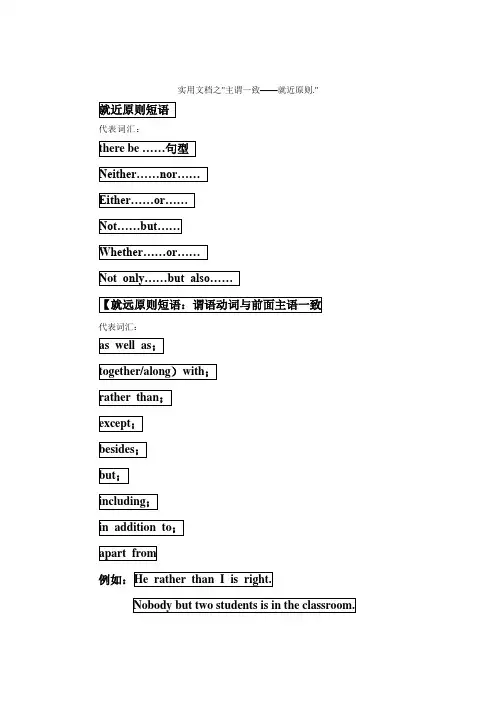
实用文档之"主谓一致——就近原则."代表词汇:代表词汇:主谓一致现象。
有一类连接词,其后的谓语动词要与连接词前一部分的主语保持一致。
此类连接词有with, along with, together with, as well as, besides, like, without, except (but), including等。
例如:Tracy, like many girls, loves dancing. 特蕾西像很多女孩一样,喜欢跳舞。
All the students, including Tom, are leaving. 所有的学生,包括汤姆都走了。
No one except (but) me knows about this news. 除了我没有人知道这个消息。
就近原则现象。
还有另一类连接词,句中的谓语动词要与靠近的主语保持一致。
此类连接词有or, either... or, neither...nor, not only... but also等。
例如:Neither you nor I am wrong. 你和我都没错。
Not only the students but also the teacher wishes for a holiday. 不仅是学生,就连老师也期盼一个假期。
1.There be 句型There is a book and some pencils on the desk.=There are some pencils and a book on the desk.2.neither...nor... Neither you nor he is right.= Neither he nor you are right.3.either...or... Either they or Jim is going to Shanghai next Saturday.= Either Jim or they are going to shanghai next Saturday.4.not only...but also... Not only Ann but also her parents stay at home every Sunday.= Not only Ann's parents but also she stays at home every Sunday.百度词条:就近原则也称“邻近原则”“就近一致原则”(Proximity),即:谓语与靠近的名词、代词(有时不一定是主语)在“人称、数”上一致。
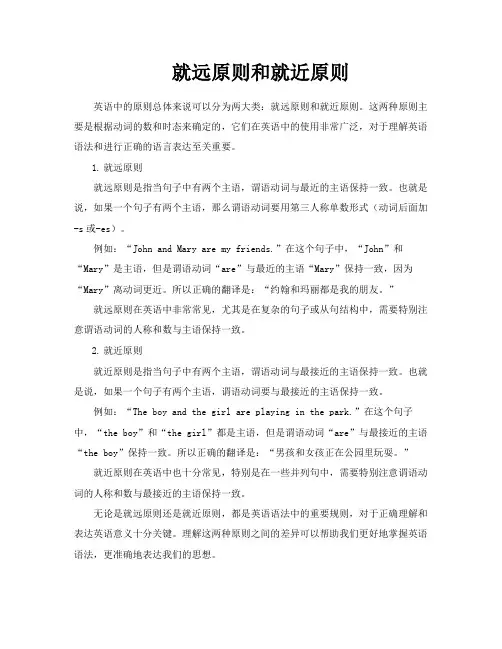
就远原则和就近原则英语中的原则总体来说可以分为两大类:就远原则和就近原则。
这两种原则主要是根据动词的数和时态来确定的,它们在英语中的使用非常广泛,对于理解英语语法和进行正确的语言表达至关重要。
1.就远原则就远原则是指当句子中有两个主语,谓语动词与最近的主语保持一致。
也就是说,如果一个句子有两个主语,那么谓语动词要用第三人称单数形式(动词后面加-s或-es)。
例如:“John and Mary are my friends.”在这个句子中,“John”和“Mary”是主语,但是谓语动词“are”与最近的主语“Mary”保持一致,因为“Mary”离动词更近。
所以正确的翻译是:“约翰和玛丽都是我的朋友。
”就远原则在英语中非常常见,尤其是在复杂的句子或从句结构中,需要特别注意谓语动词的人称和数与主语保持一致。
2.就近原则就近原则是指当句子中有两个主语,谓语动词与最接近的主语保持一致。
也就是说,如果一个句子有两个主语,谓语动词要与最接近的主语保持一致。
例如:“The boy and the girl are playing in the park.”在这个句子中,“the boy”和“the girl”都是主语,但是谓语动词“are”与最接近的主语“the boy”保持一致。
所以正确的翻译是:“男孩和女孩正在公园里玩耍。
”就近原则在英语中也十分常见,特别是在一些并列句中,需要特别注意谓语动词的人称和数与最接近的主语保持一致。
无论是就远原则还是就近原则,都是英语语法中的重要规则,对于正确理解和表达英语意义十分关键。
理解这两种原则之间的差异可以帮助我们更好地掌握英语语法,更准确地表达我们的思想。
在英语学习中,正确理解和运用就远原则和就近原则对于提高英语口语、阅读、写作等技能都非常重要。
首先,在口语中,我们需要根据实际情况灵活运用这两种原则,以确保表达的准确性。
例如,当我们介绍多个人或事物时,需要根据实际情境确定谓语动词的人称和数的形式。
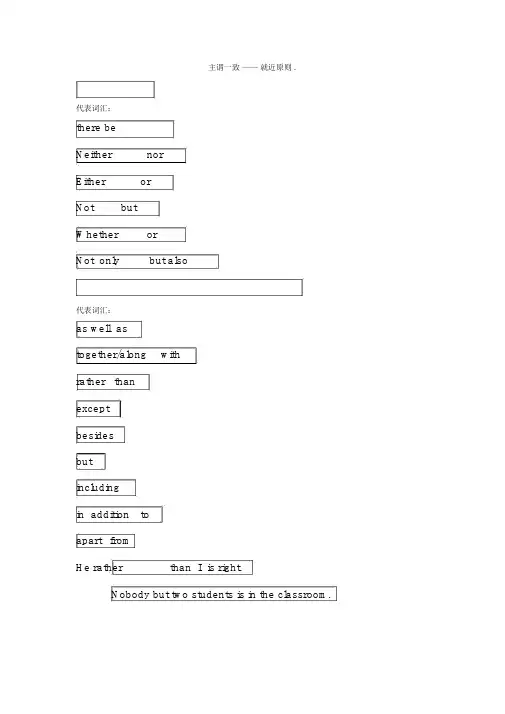
主谓一致——就近原则 .代表词汇:there beNeither norEither orNot butWhether orNot only but also代表词汇:as well astogether/along withrather thanexceptbesidesbutincludingin addition toapart fromHe rather than I is right.Nobody but two students is in the classroom.主谓一致现象。
有一类连结词,后来的谓语动词要与连结词前一部分的主语保持一致。
此类连结词有with, along with, together with, as well as, besides, like, without, except (but), including等。
比如:Tracy, like many girls, loves dancing.特蕾西像好多女孩同样,喜爱跳舞。
All the students, including Tom, are leaving.所有的学生,包含汤姆都走了。
No one except (but) me knows about this news. 除了我没有人知道这个信息。
就近原则现象。
还有另一类连结词,句中的谓语动词要与凑近的主语保持一致。
此类连结词有or, either... or, neither...nor, not only... but also 等。
比如:Neither you nor I am wrong.你和我都没错。
Not only the students but also the teacher wishes for a holiday. 不单是学生,就连老师也期盼一个假期。
1.There be 句型There is a book and some pencils on the desk.=There are some pencils and a book on the desk.2.neither...nor... Neither you nor he is right.= Neither he nor you are right.3.either...or... Either they or Jim is going to Shanghai next Saturday.= Either Jim or they are going to shanghai next Saturday.4.not only...but also... Not only Ann but also her parents stay at home every Sunday.= Not only Ann's parents but also she stays at home every Sunday.百度词条:就近原则也称“周边原则”“就近一致原则”(Proximity),即:谓语与凑近的名词、代词(有时不必定是主语)在数”上一致。
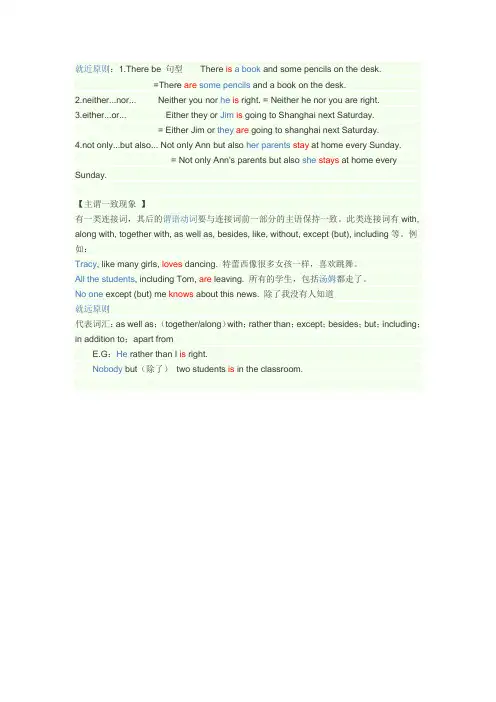
就近原则:1.There be 句型There is a book and some pencils on the desk.=There are some pencils and a book on the desk.2.neither...nor... Neither you nor he is right. = Neither he nor you are right.3.either...or... Either they or Jim is going to Shanghai next Saturday.= Either Jim or they are going to shanghai next Saturday.4.not only...but also... Not only Ann but also her parents stay at home every Sunday.= Not only Ann's parents but also she stays at home every Sunday.【主谓一致现象】有一类连接词,其后的谓语动词要与连接词前一部分的主语保持一致。
此类连接词有with, along with, together with, as well as, besides, like, without, except (but), including等。
例如:Tracy, like many girls, loves dancing. 特蕾西像很多女孩一样,喜欢跳舞。
All the students, including Tom, are leaving. 所有的学生,包括汤姆都走了。
No one except (but) me knows about this news. 除了我没有人知道就远原则代表词汇:as well as;(together/along)with;rather than;except;besides;but;including;in addition to;apart fromE.G:He rather than I is right.Nobody but(除了)two students is in the classroom.。
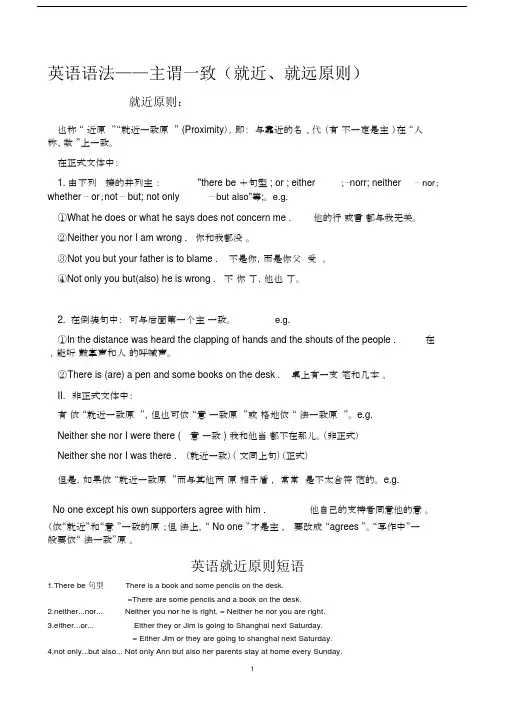
英语语法——主谓一致(就近、就远原则)就近原则:也称“ 近原”“就近一致原” (Proximity),即:与靠近的名、代(有不一定是主)在“人称、数”上一致。
在正式文体中:1. 由下列接的并列主:"there be +句型 ; or ; either;⋯norr; neither⋯nor;whether ⋯ or;not ⋯ but; not only⋯but also"等;。
e.g.①What he does or what he says does not concern me .他的行或言都与我无关。
②N either you nor I am wrong . 你和我都没。
③N ot you but your father is to blame . 不是你,而是你父受。
④Not only you but(also) he is wrong . 不你了,他也了。
2. 在倒装句中:可与后面第一个主一致。
e.g.①In the distance was heard the clapping of hands and the shouts of the people .在,能听鼓掌声和人的呼喊声。
②T here is (are) a pen and some books on the desk . 桌上有一支笔和几本。
II.非正式文体中:有依“就近一致原”,但也可依“意一致原”或格地依“ 法一致原”。
e.g.Neither she nor I were there (意一致)我和他当都不在那儿。
(非正式)Neither she nor I was there .(就近一致)(文同上句)(正式)但是,如果依“就近一致原”而与其他两原相矛盾,常常是不太合符范的。
e.g.No one except his own supporters agree with him .他自己的支持者同意他的意。

主谓一致和就近就远原则YKK standardization office【 YKK5AB- YKK08- YKK2C- YKK18】主谓一致和就近就远原则就近一致原则也称“邻近原则”“就近一致原则”,即:谓语与靠近的名词、代词(有时不一定是主语)在“人称、人数”上一致。
一、在正式文体中:1.由下列词语连接的并列主语:“there be+句型;oreither...or;nor;neither...nor;whether...or;not...but;not only...but also”等。
Eg.(1)What he does or what he says does not concern me.他的行为或言谈与我无关。
(2)Neither you nor I am wrong.你和我都没错。
(3)Not you but your father is to blame.不是你,而是你的父亲该受责备。
(4)Not only you but (also) he is wrong.不仅你错了,他也错了。
2.在倒装句中,谓语可与后面第一个主语一致。
Eg.(1)In the distance was heard the clapping of hands and the shouts of the people.在远处,能听见鼓掌和人们的呼喊声。
(2)There is (are) a pen and some books on the desk.桌上有一支钢笔和几本书。
非正式文体中:有时依“就近”和“意义”一致的原则;但语法上,“no one”才是主语,谓语要改成“agrees”。
“写作中”一般要依“语法一致”原则。
总结:英语就近原则短语1.There be句型 There is a book and some pencils on the desk.=There are some pencils and a book on the desk.2.Neither...nor...Neither you nor he is right.=Neither he nor you are right.3.either...or...Either they or Jim is going to Shanghai next Saturday.=Either Jim or they are going to Shanghai next Saturday.4.not only...but also...Not only Ann but also her parents stay at home every Sunday.=Not only Ann’s parents but also she stays at home every Sunday.就远原则谓语动词与前面主语一致代表词汇:as well as;(together/along)with;Ratherthan;except;besides;but;including;in addition to;apart from例子:He rather than I is right.Nobody but two students is in the classroom.主谓一致一、当主语后面与with,as well as,but,except,like,rather than,no less than,besides,including等+名词或代词连用时,谓语动词与第一个主语保持一致。
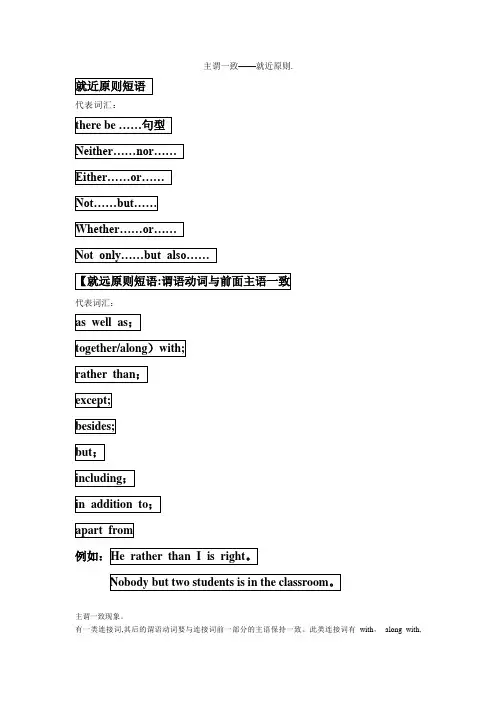
主谓一致——就近原则.代表词汇:代表词汇:主谓一致现象。
有一类连接词,其后的谓语动词要与连接词前一部分的主语保持一致。
此类连接词有with,along with,together with, as well as,besides, like, without,except (but),including等.例如:Tracy, like many girls,loves dancing. 特蕾西像很多女孩一样,喜欢跳舞.All the students, including Tom, are leaving. 所有的学生,包括汤姆都走了.No one except (but)me knows about this news. 除了我没有人知道这个消息.就近原则现象。
还有另一类连接词,句中的谓语动词要与靠近的主语保持一致。
此类连接词有or, either。
.. or,neither。
nor,not only... but also等。
例如:Neither you nor I am wrong。
你和我都没错.Not only the students but also the teacher wishes for a holiday。
不仅是学生,就连老师也期盼一个假期。
1。
There be 句型There is a book and some pencils on the desk.=There are some pencils and a book on the desk。
2。
neither...nor... Neither you nor he is right。
= Neither he nor you are right。
3。
either.。
or.。
. Either they or Jim is going to Shanghai next Saturday。
= Either Jim or they are going to shanghai next Saturday。
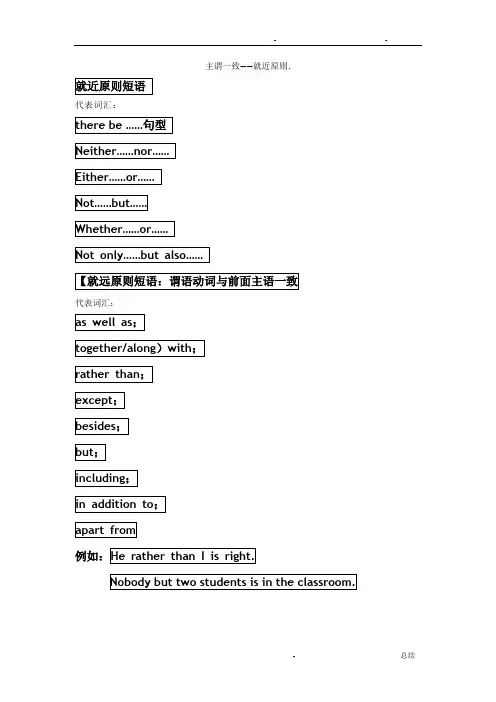
主谓一致——就近原则.代表词汇:代表词汇:主谓一致现象。
有一类连接词,其后的谓语动词要与连接词前一部分的主语保持一致。
此类连接词有with, along with, together with, as well as, besides, like, without, except (but), including等。
例如:Tracy, like many girls, loves dancing. 特蕾西像很多女孩一样,喜欢跳舞。
All the students, including Tom, are leaving. 所有的学生,包括汤姆都走了。
No one except (but) me knows about this news. 除了我没有人知道这个消息。
就近原则现象。
还有另一类连接词,句中的谓语动词要与靠近的主语保持一致。
此类连接词有or, either... or, neither...nor, not only... but also等。
例如:Neither you nor I am wrong. 你和我都没错。
Not only the students but also the teacher wishes for a holiday. 不仅是学生,就连老师也期盼一个假期。
1.There be 句型There is a book and some pencils on the desk.=There are some pencils and a book on the desk.2.neither...nor... Neither you nor he is right.= Neither he nor you are right.3.either...or... Either they or Jim is going to Shanghai next Saturday.= Either Jim or they are going to shanghai next Saturday.4.not only...but also... Not only Ann but also her parents stay at home every Sunday.= Not only Ann's parents but also she stays at home every Sunday.百度词条:就近原则也称“邻近原则”“就近一致原则”(Proximity),即:谓语与靠近的名词、代词(有时不一定是主语)在“人称、数”上一致。
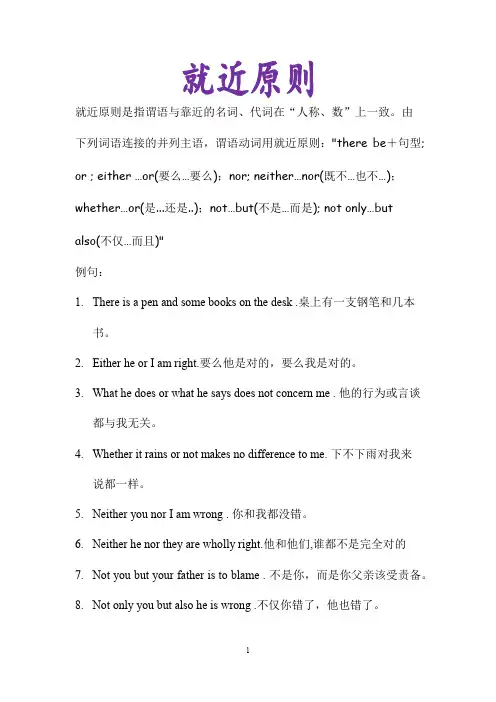
就近原则是指谓语与靠近的名词、代词在“人称、数”上一致。
由下列词语连接的并列主语,谓语动词用就近原则:"there be+句型; or ; either …or(要么…要么);nor; neither…nor(既不…也不…);whether…or(是...还是..);not…but(不是…而是); not only…butalso(不仅…而且)"例句:1.There is a pen and some books on the desk .桌上有一支钢笔和几本书。
2.Either he or I am right.要么他是对的,要么我是对的。
3.What he does or what he says does not concern me . 他的行为或言谈都与我无关。
4.Whether it rains or not makes no difference to me. 下不下雨对我来说都一样。
5.Neither you nor I am wrong . 你和我都没错。
6.Neither he nor they are wholly right.他和他们,谁都不是完全对的7.Not you but your father is to blame . 不是你,而是你父亲该受责备。
8.Not only you but also he is wrong .不仅你错了,他也错了。
当用作主语的成分后面跟有由but, except, besides, including, like, with, as well as, as much as, no less than, along with, in addition to, combined with, rather than, together with等引出的短语时,谓语动词习惯上要与这些结构前面的主语保持一致(即与比较远的那个主语保持一致,简称“就远原则”)。


主谓一致——就近原则.就近原则短语代表词汇:there be ……句型Neither……nor……Either……or……Not……but……Whether……or……Not only……but also……【就远原则短语:谓语动词与前面主语一致代表词汇:as well as;together/along)with;rather than;except;besides;but;including;in addition to;apart from例如:He rather than I is right.Nobody but two students is in the classroom.主谓一致现象。
有一类连接词,其后的谓语动词要与连接词前一部分的主语保持一致。
此类连接词有with, along with, together with, as well as, besides, like, without, except (but), including等。
例如:Tracy, like many girls, loves dancing. 特蕾西像很多女孩一样,喜欢跳舞。
All the students, including Tom, are leaving. 所有的学生,包括汤姆都走了。
No one except (but) me knows about this news. 除了我没有人知道这个消息。
就近原则现象。
还有另一类连接词,句中的谓语动词要与靠近的主语保持一致。
此类连接词有or, either... or, neither...nor, not only... but also等。
例如:Neither you nor I am wrong. 你和我都没错。
Not only the students but also the teacher wishes for a holiday. 不仅是学生,就连老师也期盼一个假期。
主谓一致——就近原则.代表词汇:代表词汇:主谓一致现象.有一类连接词,其后的谓语动词要与连接词前一部分的主语保持一致。
此类连接词有with,along with,together with, as well as,besides, like,without,except (but), including等。
例如:Tracy,like many girls, loves dancing。
特蕾西像很多女孩一样,喜欢跳舞.All the students, including Tom, are leaving. 所有的学生,包括汤姆都走了.No one except (but) me knows about this news. 除了我没有人知道这个消息.就近原则现象。
还有另一类连接词,句中的谓语动词要与靠近的主语保持一致。
此类连接词有or,either... or,neither.。
nor, not only。
.。
but also等。
例如:Neither you nor I am wrong. 你和我都没错。
Not only the students but also the teacher wishes for a holiday。
不仅是学生,就连老师也期盼一个假期.1。
There be 句型There is a book and some pencils on the desk.=There are some pencils and a book on the desk。
2。
neither...nor。
.. Neither you nor he is right。
= Neither he nor you are right。
3.either。
..or。
. Either they or Jim is going to Shanghai next Saturday.= Either Jim or they are going to shanghai next Saturday.4.not only。
主谓一致——就近原则.代表词汇:代表词汇:主谓一致现象..有一类连接词;其后的谓语动词要与连接词前一部分的主语保持一致..此类连接词有with; along with; together with; as well as; besides; like; without; except but; including等..例如:Tracy; like many girls; loves dancing. 特蕾西像很多女孩一样;喜欢跳舞..All the students; including Tom; are leaving. 所有的学生;包括汤姆都走了..No one except but me knows about this news. 除了我没有人知道这个消息..就近原则现象..还有另一类连接词;句中的谓语动词要与靠近的主语保持一致..此类连接词有or; either... or; neither...nor; not only... but also等..例如:Neither you nor I am wrong. 你和我都没错..Not only the students but also the teacher wishes for a holiday. 不仅是学生;就连老师也期盼一个假期..1.There be 句型There is a book and some pencils on the desk.=There are some pencils and a book on the desk.2.neither...nor... Neither you nor he is right.= Neither he nor you are right.3.either...or... Either they or Jim is going to Shanghai next Saturday.= Either Jim or they are going to shanghai next Saturday.4.not only...but also... Not only Ann but also her parents stay at home every Sunday.= Not only Ann's parents but also she stays at home every Sunday.百度词条:就近原则也称“邻近原则”“就近一致原则”Proximity;即:谓语与靠近的名词、代词有时不一定是主语在“人称、数”上一致..I.在正式文体中:1.由下列词语连接的并列主语:"or ; either …or;nor; neither…or;whether…or;not…but; not only…but also" ; 等..e.g.①What he does or what he says does not concern me . 他的行为或言谈都与我无关..②Neither you nor I am wrong . 你和我都没错..③Not you but your father is to blame . 不是你;而是你父亲该受责备..④Not only you hutalso he is wrong .不仅你错了;他也错了..2. 在倒装句中:谓语可与后面第一个主语一致..e.g.①In the distance was heard the clapping of hands and the shouts of the people . 在远处;能听见鼓掌声和人们的呼喊声..②There is are a pen and some books on the desk .桌上有一支钢笔和几本书..II. 非正式文体中:有时依“就近一致原则”;但也可依“意义一致原则”或严格地依“语法一致原则”..e.g.Neither she nor I were there 意义一致我和他当时都不在那儿..非正式Neither she nor I was there .就近一致译文同上句正式但是;如果依“就近一致原则”而与其他两项原则相矛盾时;则常常认为是不太合符规范的..e.g.No one except his own supporters agrees with him .仅他自己的支持者同意他的意见..依“就近”和“意义”一致的原则;但语法上;“No one ”才是主语;谓语要改成“agrees”..“写作中”一般要依“语法一致”原则..主谓一致分为两大类:就近一致原则和意义一致原则..就近一致原则指的是;以靠近谓语动词的;作主语的名词作为人称和数的参考标准..意义一致原则指的是;必须分析主语属于单数或是复数;可数或是不可数;然后才能决定谓语动词的人称和数的形式..就近一致原则1连词not only...but also/ neither...nor/ or/ either...or/ not...but<><><>Not only the students but also the teacher is enjoying the film.不仅学生而且老师都在津津乐道地看着电影..Neither the students nor the teacher knows anything about it.同学们和老师对此都一无所知..Neither he nor they are wholly right.他和他们;谁都不是完全对的..Either he or I am right.或者他对;或者我对..就近一致原则2副词here/ there<><><>Here comes the bus.瞧;公共汽车来了..Here is a pencil-box for you.这儿有一个铅笔盒要给你..Here are my replies to your questions.这些是我针对你的问题的回答..There is an apple; two bananas and some oranges on the plates.盘子里有一个苹果;两条香蕉和一些桔子..主谓一致:andand的两边分别是不同的可数名词..John and Mary are my friends.约翰和玛丽都是我的朋友..<><><>and的两边分别是不同的不可数名词..Both rice and wheat are grown in China.中国有种水稻也有种小麦..<><><>and的两边的单词构成一个统一的概念..那位诗人兼作家来了..同一个人既是诗人又是作家主谓一致指的是句子的谓语动词与其主语在数上必须保持一致;句子的主语是第三人称单数;其谓语动词须用单数;主语是复数;则谓语动词用复数..1.主谓一致的三个原则..英语中的主谓一致主要遵循三个原则:意义一致原则、语法一致原则和就近原则..这三个原则常常发生矛盾;但当发生冲突时;意义一致原则为优先考虑的原则..1语法一致原则:主语和谓语通常是在语法形式上取得一致;即主语是单数形式;谓语动词也应采取单数形式;主语是复数形式;谓语动词也应采取复数形式..She is a girl.她是女孩..They are all girls.她们都是女孩..The professor and writer is invited to many universities to deliver lectures.这位教授兼作家被邀请到很多大学作报告..教授与作家是同一个人;是单数.The old are very well taken care of in our city.老年人在我们城市被照顾得很好.. the old 指所有的老年人;指一类人;为复数概念..2就近原则:谓语动词的人称和数由靠近它的主语决定..There is a book;two pens and three pencils on the desk.书桌上有一本书;两支钢笔和三支铅笔..There are two pens;a book and three pencils on the desk.书桌上有两支钢笔;一本书和三支铅笔..Either my sisters or my mother is coming.不是我的姐妹们就是我的妈妈要来..3意义一致原则:主语形式上是单数;但表达复数意义;那么谓语动词要用复数形式;或主语形式上是复数;但表达单数意义;则谓语动词也采用单数形式..The police are still running after the murderer.警察还在追杀人犯..The news was very exciting.这则新闻令人激动..My family were watching TV at 7 o'clock.7点钟的时候;我们全家人在看电视..My family has moved three times.我们家搬过三次..2.主谓一致的应用..1单一主语的情况..单一主语指的是由一个中心名词或名词短语构成的主语;其主语与谓语的一致情况如下:①不定代词作主语a.不定代词either; neither; each; one; the other;another;someone;somebody;something;anyone;anybody;anything;everyone; everybody;everything; nobody; no one; nothing等作主语时;谓语动词常用单数、b. none作主语时如果指人或可数的物;表数目;谓语动词单复数形式皆可;如果指不可数名词;表量;谓语动词用单数..Jimmy has used up all the money. None is left.吉米把所有的钱都用光了;一点没留..c. neither/either of+复数名词或复数形式的代词;谓语动词可用单数;也可用复数..Neither of these words is correct.这些单词没有一个是正确的..d. the other two…;the other three…another two ... ; both等作主语时谓语动词用复数、Five people came to help;but another three were still needed.已经有五个人来帮忙了;但我们还需要三个e. all指人时作主语;谓语动词用复数;指全部事情时;谓语动词常用单数‘All the work was finished.所有的活都干完了All is going well一切都很正常.f.在each… . and each;every….and every;no….and no;many a. . . and many a等由and连接并列单数主语的结构中;谓语动词用单数、Each boy and each girl has got a seat.每个男孩和女孩都有一个座位.Every man and everv woman is at work.每个男人和女人都在工作.No sound and no voice is heard for a long while.很长时间没有听到一点声音Every boy and every girl likes the film star.所有的男孩和女孩都喜欢这个电影明星g. such山作主语时;谓语动词的单复数形式应根据其意义而定、Such is Stephen Hawking;who has suffered a great deal but achieved so much.这就是史蒂芬·霍金;遭受着巨大痛苦而作出巨大成就的人..Such as have plenty of money want more money.那些有足够钱的人还想要更多的钱..②集合名词作主语a.有些集体名词;如people; cattle; police等形式上是单数;但意义上是复数;谓语动词需用复数..People are talking about the accident happened yesterday.人们还在谈论昨天发生的那场事故..b.集合名词;如audience观众;army; class; crew船员;company公司;crowd人群;enemy;family; group; government政府;public 公众;population人口;team队员等作主语时;若作为一个整体看待;谓语用单数;若着眼于组成该集体的一个个成员或个体时;谓语就该用复数..The population in China is very large and 80% of the population live in rural areas.中国人口很多;其中80%的人住在农村..c. 有些以-sh; -ese ; -ch结尾的表示国家、民族的形容词与the连用时表示复数含义;谓语动词用复数如the English; the Chinese;the French等The English are a polite people.英国是一个礼仪之邦..③以复数形式结尾的特殊名词作主语a.以一ics结尾的表示学科名称的名词作主语时;谓语用单数.Politics is taught in our school.我们学校开设政治课..b.专有名词如国名、人名、书名、组织机构等作主语;形式上即使是复数;谓语动词也要用单数;如the United Nations; the United States;the New York Times等..Lu Xun's works sells well. 鲁迅的着作很畅销..c.有些名词如..arnings; thanks; goods; leavings残渣;剩余;clothes; trousers; belongings 财产;savings; scissor;等作主语;其谓语动词只能用复数形式The family were saved but the belongings were lost.这一家人获救;但损失了所有财产..d. means ; sheep ; leer; crossroad、等单复数同形的名词作主语;谓语动词根据其单复数而定Each means has been tried to solve the problem;but none is effective.每一种方法都试过;但没有一个是有效的..④含有修饰语的名词作主语a一些由两个对应部分组成一体的复数名词;如trousers ; pants; glasses; scissgrs等作主语;前面若无a pair of; a suit of; a set of; a series of等这类单位词;通常作复数用;谓语动词作复数..若带有单位词;则由单位词的单复数决定谓语动词的单复数形式..My shoes are under the bed.我的鞋在床下..His black trousers are too long.他的那条黑裤子太长了..Your glasses are on your nose.你的眼镜在鼻子上..但若这类名词与a pair连用时;谓语动词往往用单数..This pair of shoes is made in Beijing.这双鞋子是北京制造的..There is a pair of glasses on your bed.你的床上有副眼镜..b. a number of'意为“许多”;修饰可数名词复数时谓语一般也用复数:the number of 意为“……的数目”;作主语时;谓语·只能用单数A number of the other plants were found in America.在美洲还发现了许多别的植物..The number of people who travel by plane in China is larger than ever before.在中国乘飞机旅行的人数比以往多了..c.只修饰可数名词的量词several; a few; few; quite a few; a great manvof...作主语;谓语动词应用复数形式;其修饰的名词作主语、谓语动词也应用复数形式Usually few regard their work as a pleasure. 通常很少有人把工作当成娱乐..d. some; plenty of'; a lot of ; lots of等词既可修饰可数名词;又可修饰不可数名词;谓语的形式应根据所修饰词而定、A lot of students are coming to the meeting.很多学生要来参加这次会议..A lot of work is to be done to prepare for the conference.为了准备会议;还有很多工作要做..〔注意」a quantity of ; large quantities of作主语或其修饰的名词作主语;谓语动词应根据quantity的单复数形式而定..Quantities of money are needed to equip the school.学校安装设备需要很多钱..A quantity of story books has been bought for the children.为孩子们买了大量的故事书:e. a great/ good deal of;a little;quite a little;a large amount of等修饰不可数名词的量词作主语或修饰的名词作主语;谓语动词只能用单数形式A great deal of time was wasted playing but ought to have been fully used.很多时间在玩耍中浪费掉了;但本应好好利用的f. "more than one十单数名词”尽管意义上是复数;但因中心词是单数形式;谓语也必须用单数以符合语法一致的原则在“more+复数名词+than one”结构之后;谓语常用复数.More than one person was injured in the accident.不止一人在这次事故中受伤-More members than one are against the proposal.反对这项提议的会员不止一个g. "one or two +复数名词”作主语时;谓语动词用复数One or two students were planting trees yesterday afternoon.昨天下午有一两个学生在植树h.表示时间、距离、价格、度量衡的复数名词与pass; go by;waste; use; spend等词连用时;谓语动词用复数Five years have passed since I joined the Party.我入党五年了i. one or two 后接复数名词;谓语要用复数但在“a/an十单数名词+or two”结构之后;谓语却常用单数One or two days are enough for this work.=A day or two is enough for this work.干这活一两天就够了j. the restof…;the remaining;partof...;one half' of…等词或短语作主语和它们所修饰的名词或代词作主语;谓语动词应根据主语所表达的单复数而定Part of his story was not true.他讲的故事有一部分不是真的..Part of the foreign teachers in our school are from Canada.我们学校一部分外籍教师来自加拿大.k.当“几分之几百分之几+ of+名词”结构作主语时;一般也应根据of后的名词的单复数决定谓语动词的单复数"one and a half +复数可数名词”作主语;谓语一般用单数.This is because two thirds of the earth's surface is made up of vast oceans.这是因为地球表面积的2/3是由广阔的海洋构成的Two thirds of these tasks have been completed.这些任务已经完成了三分之..One and a half days is all I can spare.我只能抽出一天半的时间It is reported that in this area one in four people suffers from lung cancer.据报道在此地区有四分之一的人患肺癌一般情况下;one in ten作主语和其修饰的名词作主语;谓语动词用单数形式2非谓语形式、从句作主语①单独的不定式、动词的一ing形式作主语时;谓语动词一般用单数形式:如果多个非谓语动词连在一起表达同一概念;谓语动词用单数形式;如果表达不同概念;谓语动词用复数Persuading him to join us seems really hard.劝他加入我们似乎很难..To go to bed early and to rise early is a good habit.早睡早起是好习惯..To work and to live are two different things but they are always together.虽然工作和生活是两件不同的事情;但是它们永远相伴..②that;what;who;which;when;where;why;whatever; whoever;whichever; whenever; whereve:等引导的从句作主语或单独引导疑问句时;应根据概念上一致的原则决定谓语动词的数"That .lack has gone abroad makes us all surprised.杰克出国去了使我们都很惊讶Who is Abraham Lincoln林肯是谁Who are talking with each other谁在相互讨论3以并列结构作主语的主谓一致①and及both... and...a. 一般来说;两个单数主语用and连接起来;表示两个不同的人或物;谓语动词用复数;但如果两个并列的单数主语在意义上指同一个人、同一个事物或同一个概念;谓语动词必须用单数A smile and handshake show welcome.微笑和握手表示欢迎The poet and writer has produced many works.这个诗人兼作家写出很多作品、b.并列主语由or; either.. . or. . . ; neither... nor. . . ; not only…but also…连接时;谓语动词常与邻近的主语保持人称、数的一致Either the teacher or the students are to blame. 或者是老师;或者是学生要受到责备Not only the students but also their teacher doesn't know about it.不仅仅是学生;还有他们的老师都对此一无所知_Neither you nor I am fit for the work.你和我都不适合干这个工作-Are neither you nor I fit for the work你和我都不适合干这个工作吗4假性主语的主谓一致with;together with连同;along with和·····一起;as wellas也;like诸如;such as诸如;as much as; no less than和····一样;rather than而不是;including; besides; but;except; in addition以除……之外等短语后的主语称为假性主语;谓语动词仍然根据原主语而定;不跟假性主语一致..The boy with his dog is here.这个男孩在这儿;还有他的狗No one but your parents was there then.那时;除了你的父母没有别人在那里Tom;together with Mary and Alice;is going to swim this afternoon.汤姆今天下午要和玛丽及艾丽丝去游泳The teacher;including his students;is going to see Professor Smith.那位老师和他的学生们将去看望史密斯教授、5由there ; here引导的主语不止一个时;谓语通常和最邻近的主语保持一致、There is a lake and some hills around it.它被一个湖和几座刁、山环绕着、6定语从句中的谓语动词应视先行词的单复数而定;先行词是单数;定语从句中的谓语动词也用单数;先行词是复数;定语从句中的谓语动词也用复数Thosepeoplewho are for this plan are to sign your nameright on this paper.同意这个计划的在这张纸上签名I will always treasure the moments that were full of pleasures.我将永远珍惜充满欢乐的时光:The news that has been published in today's newspaper isn't true.今天报纸上发布的新闻不是真的..7在倒装句中谓语应与后面的主语保持一致..On the wall hang some pictures by Picasso.墙上挂着一些毕加索的画..8运算数词作主语时;谓语动词用单数..Three times five is fifteen. 3乘5等于15Five minus four is one. 5减4等于1..Seven times four makes twenty-eight. 7乘4等于g9表示数量的“one and a half+复数名词”作主语时;谓语动词要用单数..One and a half bananas is left on the table.桌子上还剩有一个半香蕉..One and a half hours is enough一个半小时足够了..。
“就近”“就远”和主谓一致就近原则:1.There be 句型There is a book and some pencils on the desk.=There are some pencils and a book on the desk.2.neither...nor... Neither you nor he is right. = Neither he nor you are right.3.either...or... Either they or Jim is going to Shanghai next Saturday.= Either Jim or they are going to shanghai next Saturday.4.not only...but also... Not only Ann but also her parents stay at home every Sunday.= Not only Ann's parents but also she stays at home every Sunday.例句:①What he does or what he says does not concern me . 他的行为或言谈都与我无关。
②Neither you nor I am wrong . 你和我都没错。
③Not you but your father is to blame . 不是你,而是你父亲该受责备。
④Not only you hut(also) he is wrong .不仅你错了,他也错了。
就远原则代表词汇:as well as;(together/along)with;rather than;except;besides;but;including;in addition to;apart fromE.G:He rather than I is right.Nobody but two students is in the classroom.【主谓一致现象】有一类连接词,其后的谓语动词要与连接词前一部分的主语保持一致。
5分钟搞定主谓一致4大原则:语法or意义一致?就近or就前原则?为什么主谓一致是中国人学英语最常犯的语法错误呢?通过以下3组句子的对比,相信你很容易就能得出答案。
在汉语中,我是一个学生,他是一个学生,你是一个学生,3句中的“是”没有任何变化。
但是翻译为英语,3个句子分别是:I am a student. You are a student. He/she is a student.英语中的主谓一致,顾名思义,是一个句子的主语和谓语保持一致。
在什么方面保持一致呢?首先是上面例句体现的人称上的一致。
跟汉语一样,英语也有第一人称(I),第二人称(you),第三人称(he/she).如果想表达某人是一个学生。
第一人称I作主语,谓语动词用am,第二人称you作主语,谓语动词用are,第三人称he、she作主语,谓语动词用is,这就是主语和谓语在人称上的一致。
另外,一个句子的主语和谓语在单复数上要保持一致。
一个句子一般是先说主语,再说谓语,所以是主语的单复数决定谓语的单复数。
主语是数量1个时,谓语用单数,主语是数量多个时,谓语用复数。
把上面3个例句中作主语的人称代词都变为复数后,谓语动词也要变复数:我们是学生。
We are students. (am变复数are)你们是学生。
You are students. (you既是你又是你们,you后的are既可表单数又可表复数)他们是学生。
They are students. (is变复数are)主语和谓语在数上保持一致时的四大原则。
最基本的原则:语法一致原则最常作主语的是名词,名词分为可数和不可数,可数名词又有单数和复数形式。
所以,主谓一致最基本的原则是语法一致原则:主语是可数名词单数或不可数名词时,谓语用单数,主语是可数名词复数时,谓语用复数。
例句:Knowledge is power.知识就是力量。
(knowdge是不可数名词,谓语用单数)Books are the ladder of human progress.书籍是人类进步的阶梯。
一、就近原则
1、在here, there等引导的倒装句中, 当主语不止一个,此时谓语动
词与最靠近它的主语在数上一致喔。
例:
Here comes the bus. 巴士过来了。
There is a pencil and several photos on the desk. 桌上有一支铅笔和几
张图片。
2、连词or, either... or..., neither…nor..., not only…but also 等连接的并
列主语, 谓语动词只与靠近它的主语在数上一致哈。
例:
Either you or he knows something about the task. 要么你,要么他知道
此任务的相关情况。
Neither I nor he plays cards.我和他都没打牌.
二、就远原则
当主语后面接上as well as, accompanied by, including, in addition to,
more than,together with等引导的词组时,这些词组其实根本不影响
最前面主语本身的单复数形式。
例:
She
,as well as the other students in the classroom, is jumping with joy.
她和教室里其他学生一样开心地跳起来。
Michael Jordan,together with his teammates, has set a record in NBA.
迈克尔乔丹和他的队友们,已经一起创造了NBA的一个记录.